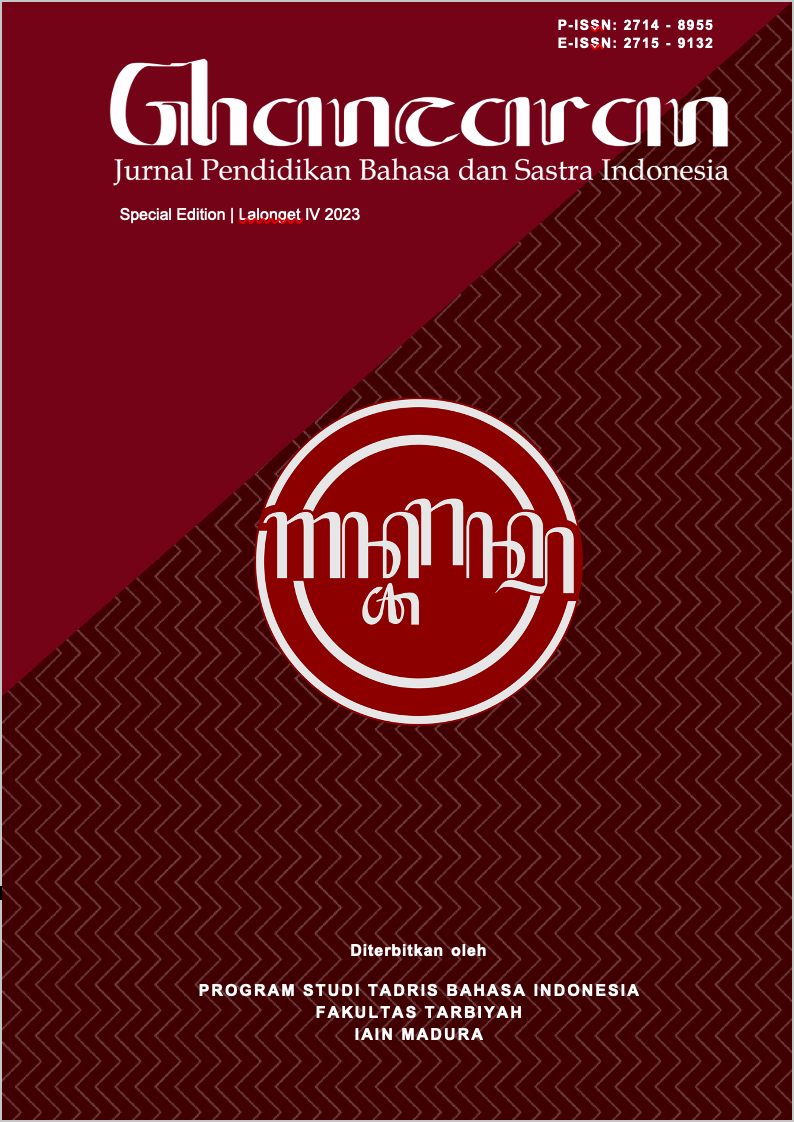Pengembangan Metode Project Based Learning “Ruang Literasi” untuk Peningkatan Keterampilan Menulis Artikel Ilmiah Mahasiswa Melalui Model Hybrid Learning
 Abstract views: 273
,
Abstract views: 273
,
 PDF downloads: 241
PDF downloads: 241
Abstract
The study of writing is a study that attracts the attention of researchers, especially in the field of language. . In this regard, this research aims to develop learning methods that can improve the quality and writing skills of students' scientific papers. The development method (R & D) which includes the stages: definition, design and development to test the effectiveness and quality of the PBL learning method "Literacy Space" was used in this research. The implementation of the development stage is carried out through a hybrid learning model. The data in this research is in the form of quantitative and qualitative data originating from student grades and student responses. Based on the research results, the "Literacy Space" PBL method shows that the "Literacy Space" PBL method has very good quality because it can improve scientific article writing skills among students and effectively applied in Indonesian language classes. A hybrid learning model also supports the effectiveness of this learning method.
Downloads
References
Ahmadi, Anas. (2019). Psychowriting: Menulis Perspektif Psikologi. Pustaka Pelajar.
Ahmadi, Anas. (2021). Teaching creative (Literary) writing: Indigenous psychological perspective. Kıbrıslı Eğitim Bilimleri Dergisi, 16(4), 1422–1433.
Antika, R. N., & Nawawi, S. (2017). The Effect of Project Based Learning Model in Seminar Course to Student’s Creative Thinking Skills. Jurnal Pendidikan Biologi Indonesia, 3(1), 72. https://doi.org/10.22219/jpbi.v3i1.3905
Barber, A. W. (2013). ‘It is Not Easy What to Say of our Condition, Much Less to Write It’: The Continued Importance of Scribal News in the Early 18th Century. Parliamentary History, 32(2), 293–316.
Cahyani, I. (2010). Peningkatan Kemampuan Menulis Makalah Melalui Model Pembelajaran Berbasis Penelitian pada Mata Kuliah Umum Bahasa Indonesia. Sosiohumanika, 3(229), 175–192.
Darmalaksana, W., & Busro., B. (2021). Akselerasi Publikasi Ilmiah Mahasiswa: Studi Kasus WPAJ HMJ IAT UIN Sunan Gunung Djati Bandung. IJoIS: Indonesian Journal of Islamic Studies, 2(2), 139–157.
Dian, R. (2012). Pergeseran Paradigma Pembelajaran pada Pendidikan Tinggi.
Evi Hasim. (2020). Penerapan Kurikulum Merdeka Belajar Perguruan Tinggi Di Masa Pandemi Covid-19. Prosiding Webinar Magister Pendidikan Dasar Pascasarjana Universitas Negeri Gorontalo “Pengembangan Profesionalisme Guru Melalui Penulisan Karya Ilmiah Menuju Anak Merdeka Belajar,” 68–74.
Farikhah, Firdaus, M. M. Al, & Yuwono, A. (1995). Technological Pedagogical Content Knowledge (TPACK): Sebuah Kerangka Pengetahuan untuk Pembelajaran Keterampilan Menulis. https://inisnu.ac.id
Handayani, R. H., & Muhammad, M. (2023). engaruh Model Pembelajaran Problem Based Learning Terhadap Hasil Belajar Siswa dalam Pembelajaran Tematik Terpadu di Kelas V SD. E-Jurnal Inovasi Pembelajaran Sekolah Dasar, 9(2), 79–88.
Hidayat, R., Khotimah, K., & Saputra, A. (2019). Mata Kuliah Wajib Umum Bahasa Indonesia Di Perguruan Tinggi: Sebuah Tawaran Model Pembelajaran. Jurnal Ilmiah Telaah, 4(1), 31. https://doi.org/10.31764/telaah.v4i1.1268
Howard, L. (2023). Writing Bees, Wikis, Problem-Based Learning, and Assessment: Teaching With Online Discussions. In In Research Anthology on Remote Teaching and Learning and the Future of Online Education (pp. 911–937). IGI Global.
Joesyiana, K. (2018). Penerapan Metode Pembelajaran Observasi Lapangan (Outdor Study) Pada Mata Kuliah Manajemen Operasional (Survey Pada Mahasiswa Jurusan Manajemen Semester III Sekolah Tinggi Ilmu Ekonomi Beserta Persada Bunda). PeKA: Jurnal Pendidikan Ekonomi Akuntansi FKIP UIR, 6(2), 90–103.
Nasution, M. K. (2017). Penggunaan metode pembelajaran dalam peningkatan hasil belajar siswa. STUDIA DIDAKTIKA: Jurnal Ilmiah Bidang Pendidikan, 11(1), 9–16.
Nurgiyantoro, B. (2011). Penilaian Pembelajaran Bahasa Berbasis Kompetensi. BPFE.
Peat, J., Elliott, E., Baur, L., & Keena, V. (2013). Scientific writing: easy when you know how. John Wiley & Sons.
Rais, M. (2010). Model project based-learning sebagai upaya meningkatkan prestasi akademik Mahasiswa. Jurnal Pendidikan Dan Pengajaran, 43(3), 246–252. https://ejournal.undiksha.ac.id/index.php/JPP/article/viewFile/129/123
Sari, M. (2014). Blended Learning, Model Pembelajaran Abad ke-21 di Perguruan Tinggi. Ta’dib, 17(2), 126–136. https://doi.org/10.19109/tjie.v24i2.4833
Sari, R. T., & Angreni, S. (2018). Penerapan Model Pembelajaran Project Based Learning (PjBL) Upaya Peningkatan Kreativitas Mahasiswa. Jurnal VARIDIKA, 30(1), 79–83. https://doi.org/10.23917/varidika.v30i1.6548
Supriyadi. (2015). PENGEMBANGAN MODEL PEMBELAJARAN MENULIS KARYA ILMIAH BERPENDEKATAN KONSTRUKTIVISME Supriyadi. LITERA, 14(2), 361–375.
Syahruddin, & Pongpalilu, F. (2014). Inovasi Pembelajaran Menulis Kreatif Melalui Web-Based Learning. JURNAL PENDIDIKAN DAN PEMBELAJARAN, 21(2), 146–154.
Trianto. (2007). Model Pembelajaran Terpadu dalam Teori dan Praktik. Prestasi Pustaka.
Umar, M. A. (2017). PENERAPAN PENDEKATAN SAINTIFIK DENGAN METODE PEMBELAJARAN BERBASIS PROYEK (Project-Based Learning) DALAMMATERI EKOLOGI Muhammad Agus Umar. BIOnatural, 4(2), 1–12.
Wismanto, A. (2022). Pengembangan Model Pembelajaran Project Based Learning dalam Pembelajaran Menulis Berita. Diksa: Pendidikan Bahasa Dan Sastra Indonesia, 8(1), 116–125.
Yuan, R. (2017). This game is not easy to play’: a narrative inquiry into a novice EFL teacher educator’s research and publishing experiences. Professional Development in Education, 43(3), 474–491.
Copyright (c) 2023 GHANCARAN: Jurnal Pendidikan Bahasa dan Sastra Indonesia

This work is licensed under a Creative Commons Attribution-ShareAlike 4.0 International License.
Ghancaran: Jurnal Pendidikan Bahasa dan Sastra Indonesia uses an Open Access Policy under the Creative Commons Attribution-ShareAlike 4.0 International License. Authors publishing in this journal agree to the following terms:
- Ghancaran Journal holds the copyright and grants the journal rights for first publication with the work simultaneously licensed under a

The work is distributed under Creative Commons Attribution-ShareAlike 4.0 International License which allows others to share, copy, and redistribute the material in any media or format and adapt, remix, change, and develop the material even for commercial purposes, as long as it is stated credit and license derivative works under similar terms. - Authors may make additional contractual arrangements for non-exclusive distribution of the journal's published work version.
- Authors are permitted to post their work online (e.g., in institutional repositories or on their websites) before and during submission, as doing so may lead to productive exchange.



















